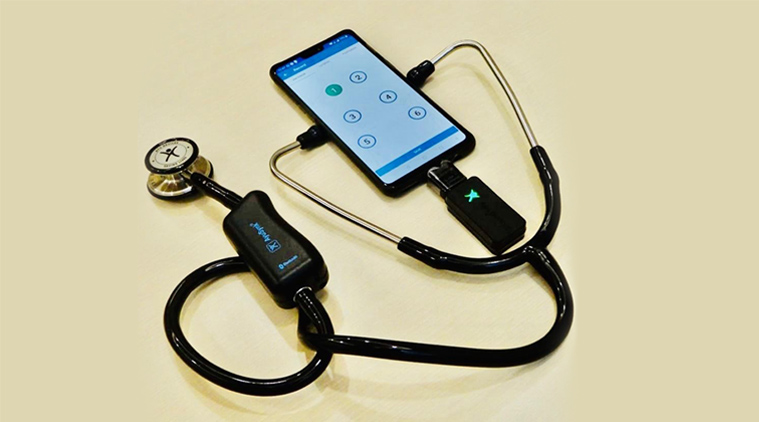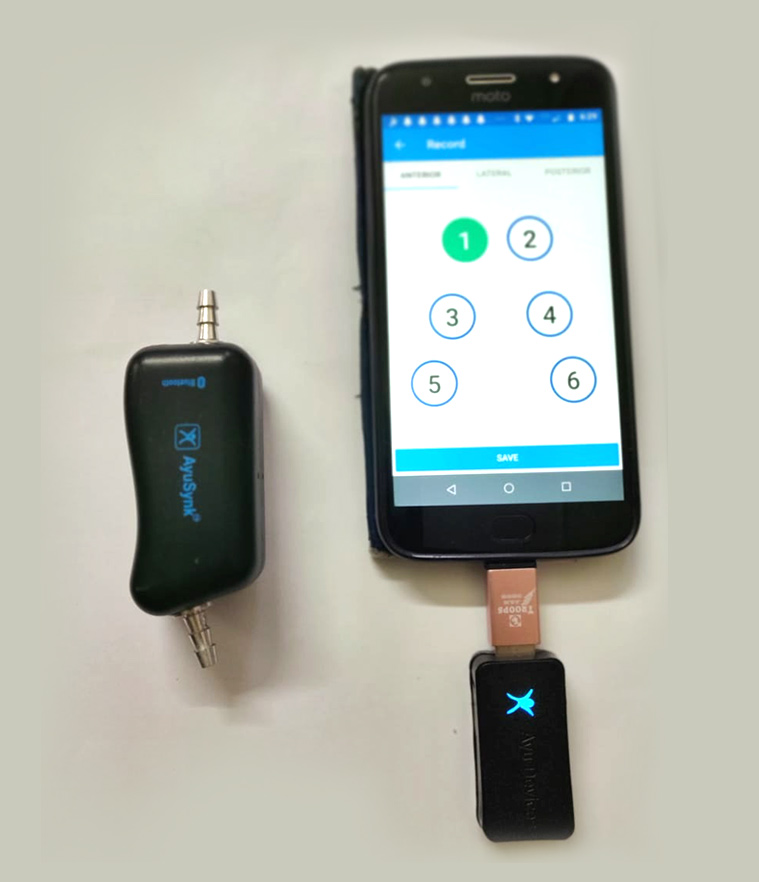 AyuSynk is a digital stethoscope developed by Ayu Devices, a firm incubated by IIT-Bombay. (Image credit: Adarsha Kachapilly)
AyuSynk is a digital stethoscope developed by Ayu Devices, a firm incubated by IIT-Bombay. (Image credit: Adarsha Kachapilly)
The white coat and the stethoscope around the neck are the best indicators that someone is a doctor. But not many realise that the stethoscope can be heavily contaminated and could act as a carrier of COVID-19. This also puts the doctors who use the apparatus throughout the day at risk. This is where AyuSynk comes in, a digital stethoscope developed by Ayu Devices, a firm incubated by IIT-Bombay.
There are COVID-19 patients, especially the elderly, who might have abnormal heart or lung conditions. In that case, a regular stethoscope will be insufficient in closely monitoring those patients’ current conditions. Also, using the stethoscope the conventional way increases the risk for the doctors.
Mumbai-based startup 3D prints protective face shields for doctors
“We have developed a device that can be attached to a conventional stethoscope so that heart and lung sounds can be amplified, recorded and shared as well as analysed,” Adarsha Kachapilly, co-founder and CEO of Ayu Devices, told indianexpress.com over phone. AyuSynk is developed by IIT-Bombay researchers Kachapilly and Tapas Pandey along with Dr. Rupesh Ghyar, a Senior Executive Officer of Biomedical Engineering and Technology incubation Centre (BETiC) at the IIT B. Dr. Nambiraj Konar at Reliance Hospital and Dr. Lancelot Pinto at PD Hinduja Hospital gave clinical inputs.
Express Tech is now on Telegram. Click here to join our channel (@expresstechnology) and stay updated with the latest tech news
In light of the recent COVID-19 pandemic, the digital stethoscope can offer a lot of advantages. For one, the core advantage of the AyuSynk is that it can be attached to any regular stethoscope. In a way, a device like AyuSynk increases the physical distance between doctor and patient, because the data is being sent wirelessly from patients to doctors without physical tubing. The stethoscope consists of a tube connected to two earpieces. The tube transmits sounds from the body while eliminating background noise that might interfere with diagnosis.
Cold, flu or Covid-19? This AI-enabled risk assessment tool can help you differentiate
The second advantage of digital stethoscopes is that they are able to amplify and filter several sounds and translate them into an electronic signal, which can be further amplified for optimal listening. The signal can then be displayed as a phonocardiogram on a smartphone or laptop. In contrast, a regular stethoscope is limited when it comes to amplifying sounds. Then there is no way of recording those sounds and sharing from one place to another. Even visualisation is not possible, which means one cannot see the graph and identify abnormalities.
 The core advantage of the AyuSynk is that it can be attached to any regular stethoscope. (Image credit: Adarsha Kachapilly)
The core advantage of the AyuSynk is that it can be attached to any regular stethoscope. (Image credit: Adarsha Kachapilly)
Adarsha says the idea of developing AyuSynk came up while he was still working as a researcher at IIT-Bombay. “There was a need for heart and lung sounds to be amplified and analysed to identify abnormalities if any,” he said. “The problem is that we have one doctor per 4,800 patients. So, this would be a way of enabling health workers or doctors at the primary level to diagnose at an early stage.
From Kerala, a robot to take care of coronavirus patients
Internally, Adarsha and his team went through eight iterations of AyuSynk before finalising the design. While designing the device, the researchers took feedback from doctors and made changes. Orders for the device started to come from telemedicine companies even before the company was set up in 2017.
AyuSynk has evolved further. The first model required a wire to transmit data from the device to mobile or laptop. However, doctors found it difficult and cumbersome to attach wires to mobiles and capture the sound.
 AyuSynk can transmit data from the stethoscope to a smartphone or laptop via Bluetooth. (Image credit: Adarsha Kachapilly)
AyuSynk can transmit data from the stethoscope to a smartphone or laptop via Bluetooth. (Image credit: Adarsha Kachapilly)
The new version of AyuSynk developed by Adarsha and his team is a two-piece hardware. The main device attaches to the standard stethoscope, while the other attachment is a USB receiver that needs to be connected to a smartphone. This way AyuSynk can transmit data from the stethoscope to a smartphone or laptop via Bluetooth. AyuSynk can be charged once and the battery lasts up to eight to ten hours.
Use the lockdown to introduce your parents to tech; here are some tips
Another part of the execution is the mobile app that saves, processes and shares sound data. This data then can be shared with another doctor, maybe a specialist via an email or WhatsApp. The company is currently taking feedback from doctors on improving the user interface of the app.
The 27-year-old researcher says several doctors and hospitals have shown interest in the AyuSynk. Mumbai-based KEM Hospital is already using the device, while the team has received a request for AyuSynk from Apollo Hospital in Hyderabad. A total of 1000 units of AyuSynk have been deployed across India.
The AyuSynk will be made in India at IIT Bombay, though not all components will be sourced within the country. The AyuSynk will be priced at Rs 16,000, which Adarsha claims is half the price of what the US-based companies typically charge for similar solutions.